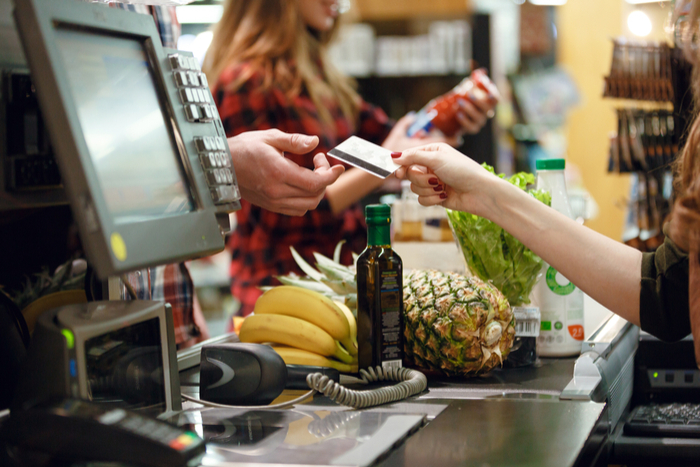// While grocers enjoyed record Christmas sales, 2019 saw the slowest growth rate over the period since 2015, according to Kantar
// Separate data from Nielsen showed that UK grocers experienced lowest growth over Christmas since 2014
// Year-on-year, Kantar said the Big 4 lost market share, Aldi, Lidl, the Co-op & Iceland gained, while Waitrose was unchanged
UK grocers have endured the lowest rate of sales growth over the crucial Christmas period since 2015, according to new market share data.
The latest figures from Kantar indicate that year-on-year supermarket sales grew marginally by 0.2 per cent in the 12 weeks to December 29.
Kantar said that while grocery retailers still took a record £29.3 billion through tills in the so-called golden quarter – up £50 million on 2018 – 2019 saw the slowest rate of growth over the Christmas period since 2015.
However, separate grocery market share data from Nielsen showed that UK supermarkets experienced the lowest sales growth over the Christmas period since 2014, with sales growing by 0.5 per cent year-on-year in the four weeks to December 28.
READ MORE: November grocery sales slow down despite Black Friday
Kantar said its latest data indicated that sales growth was hard to come by, with each of the Big 4 experiencing sales and market share decline on the previous year.
Overall, average household spending over the 12 week festive period fell by £8 to £1055, while total volume sales fell by 0.7 per cent.
Meanwhile, like-for-like shop prices only rose by just 0.9 per cent, although Kantar said the low level of inflation did little to boost the market.
“There was no sign of the post-election rush many had hoped for in the final weeks before Christmas, with shoppers carefully watching their budgets,” Kantar head of retail insight Fraser McKevitt said.
He added that shoppers “cut back on traditional and indulgent festive classics” such as turkeys, Christmas puddings, seasonal biscuits as well as alcohol.
On the other hand, Nielsen attributed the weak growth in its data to increased competition, price cuts and lower inflation.
Its data also revealed that while consumers visited supermarkets more often over the 2019 Christmas period, shoppers purchased fewer items and spent less each time.
“It is unsurprising that sales have remained relatively low over the December period, given that momentum continued to slow in the run up to Christmas this year,” Nielsen head of retailer insight Mike Watkins said.
“This has given us the lowest Christmas sales growth since 2014, with shoppers choosing to visit stores more frequently, but spending less.”
Kantar said that among the bricks and mortar grocers, Lidl led the way with sales growth of 10.3 per cent over the past 12 weeks, with its Christmas market share hitting 5.9 per cent.
Together with Aldi, the German discount grocers took their highest ever combined Christmas market share at 13.7 per cent.
Individually, Aldi’s sales were up by 5.9 per cent, and its market share grew by 0.4 percentage points to 7.8 per cent.
Kantar said the UK’s fastest-growing grocer overall continued to be Ocado, with sales rising by 12.5 per cent, with market share reaching 1.3 per cent.
Meanwhile. sales at Sainsbury’s fell by 0.7 per cent, although its market share held relatively firm dipping by just 0.1 percentage points to 16 per cent.
Tesco sales were 1.5 per cent lower over the Christmas period, with its share down by 0.4 percentage points to 27.4 per cent.
Asda and Morrisons also saw sales fall by 2.2 per cent and 2.9 per cent respectively, with their market shares also dropping to 14.8 per cent and 10.3 per cent respectively.
The Co-op’s three per cent growth was ahead of the market, and enough to increase its share by 0.2 percentage points to 6.1 per cent.
Waitrose’s market share remained at five per cent, unaffected by a 0.9 per cent fall in sales.
Iceland on the other hand enjoyed a bright festive spell as sales rose 1.3 per cent during Christmas, allowing its market share to rise one percentage point to 2.3 per cent.
Nielsen’s data showed that Sainsbury’s was the most successful of the Big 4 grocers over the 12 week period to December 28, though it still experienced a sales decline of 0.4 per cent.
Market leader Tesco, Asda, and Morrisons trailed with sales falls of 0.9 per cent, 1.1 per cent and 2.5 per cent respectively.
Parallel to Kantar’s data, Nielsen sad Aldi and Lidl continued to outperform and win market share from the Big 4.
Lidl’s sales rose 12.2 per cent, while Aldi’s were up 7.7 per cent, giving a combined market share of 15.1 per cent.
Click here to sign up to Retail Gazette‘s free daily email newsletter



















